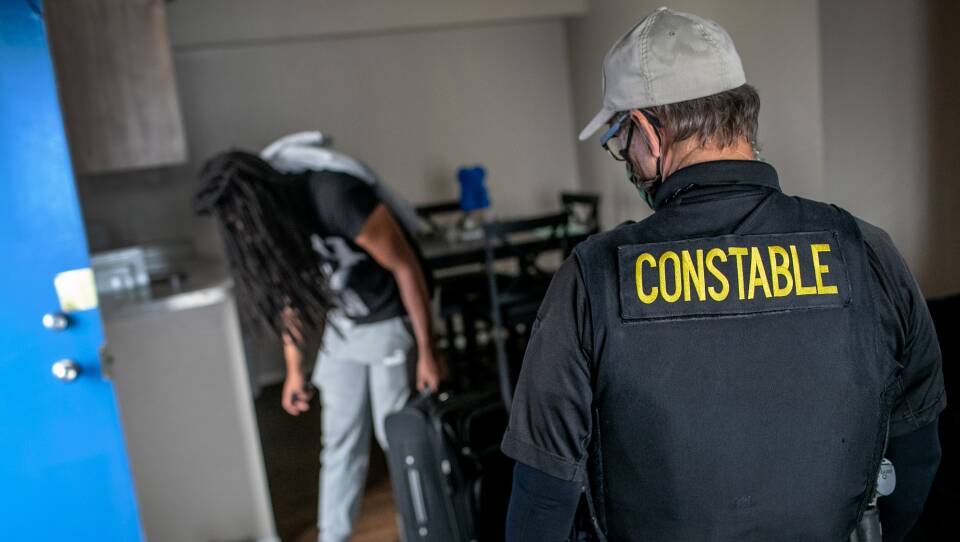When a resident is evicted or foreclosed on, the state’s Housing Court can send a constable to ensure the person leaves the property.
Some housing advocates and a state board in charge of police oversight argue constables should have additional training, similar to what police officers must go through. The Peace Officer Standards and Training Commission says it’s a precaution in case the move-outs escalate and become unsafe.
But the Massachusetts Trial Court, which manages the Housing Court, disagrees with POST, and says the board is overstepping its authority in asking for that change.
The two sides recently met to discuss the issue and work toward an agreement.
The debate is a test of the power of the POST Commission, which was created by the Massachusetts Legislature in response to the death of George Floyd in 2020. The board is responsible for setting training standards and certifying all police officers across the state.
Constables are usually appointed or elected by communities and mostly work independently of police departments. But the commission argues constables must also be certified, asserting that training is essential if they issue threats or use any force during the process of escorting people out of a home.
The POST Commission started focusing more on constables earlier this year after hearing complaints about use of force during evictions. The nonprofit Worcester Anti-Foreclosure Team, known as WAFT, which advocates for residents facing eviction, has long complained that some constables unnecessarily threaten and assault people.
Grace Ross, WAFT’s chair, said she’s witnessed constables shove and restrain people at evictions more than a dozen times. She’s also been subject to it herself when protesting move-outs.
“People have a right to their personal safety. And what needs to happen right now is that anybody who is going to be evicting anybody must be trained in use of force,” Ross said. “Because right now, we’re in a hurricane, I’d guess you call it, of evictions.”
According to Housing Court data, there have consistently been more than 3,000 new eviction cases filed in court every month since late 2022. Although many of the cases lead to settlements between landlords and tenants, some result in housing judges appointing a constable to execute an eviction.
In February, the POST Commission sent a letter to the Housing Court saying that coercively removing someone or their belongings from a premises against their will constitutes an arrest under Massachusetts’ code of regulations. The letter, obtained by GBH News, added that any constable carrying out such an arrest is acting as a law enforcement officer and therefore required to receive training and be certified by the commission.
Less than two weeks later, Daniel Sullivan, general counsel of the Trial Court, responded with his own letter to POST, which GBH also received a copy of. Sullivan wrote that an arrest occurs when someone is “fully detained” or placed in a secure location from which they cannot escape. The removal of a resident during an eviction, he said, is “at most a momentary seizure,” not an arrest.
“Requiring constables be certified as law enforcement officers to levy civil executions for possession would substantially limit their timely execution,” Sullivan wrote, adding he has “therefore counseled the Housing Court to not require constables be POST-certified.”
Sullivan declined to comment.
POST Commission Executive Director Enrique Zuniga said he recently met with Sullivan to resolve the dispute. Zuniga left the meeting hopeful both sides could reach some form of an agreement.
“We’re working towards putting together a document that will outline what we feel are areas of common ground and what essentially should be a guide to constables as to what they can and cannot do,” Zuniga said.
The president of the Massachusetts Bay Constables Association, which has about 120 members statewide, said he’s not opposed to a requirement that its members be certified by POST. But he said constables shouldn’t have to go through the same 800 hours of training as police officers to receive certification.
“Municipal constables don’t respond to 911 calls. They don’t make traffic stops,” association President Richard Ramponi said. “They’re an entirely different subset of the so-called law enforcement, and to train a municipal constable to the same level as the police, it just doesn’t make sense.”
Zuniga said the POST Commission doesn’t have the authority to create a separate training standard for constables. He said state lawmakers would have to give the commission that power, and he also called on Beacon Hill to clarify what constitutes an arrest by a constable.
For now, Zuniga said POST and the Trial Court agree that constables shouldn’t show up to evictions carrying guns.
Zuniga said he’d like constables to call the police if tenants refuse to leave during an eviction. Officers who respond can then arrest tenants for trespassing.
Constables will be expected to follow any guidelines that POST and the Trial Court finalize, Zuniga said. Otherwise, they could face fines and other penalties.
“It’s accountability,” he said. “Everybody has to be at a certain level of training. They have to comply with the regulations.”





